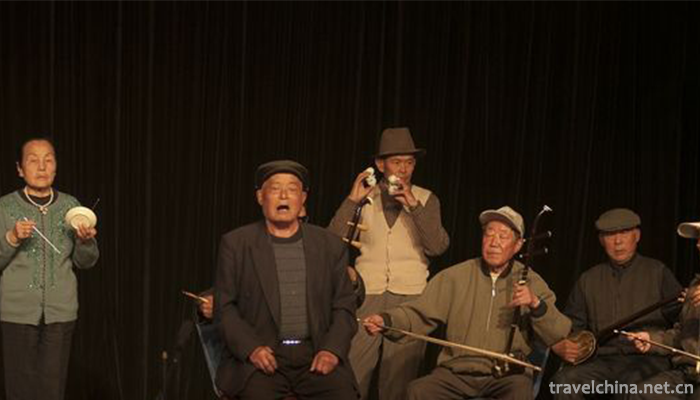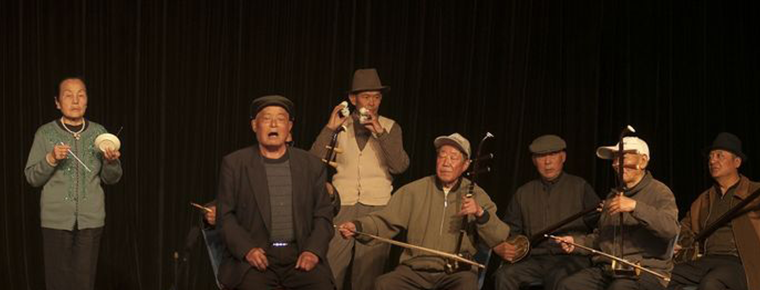Five Palace Tunes in Haizhou
Five Palace Tunes in Haizhou
Haizhou Five Palace Tunes is a traditional folk music with a long history. It is an important link of Ming and Qing folk songs in Jiangsu Province. It is a precious relic of ancient "Zhugong Tunes". It has a rare empirical value for the study of Chinese folk music and even folk music. The custom of folk singing ditties in Haizhou has a long history. Because it is located at the border of Jiangsu and Shandong provinces, and also the intersection zone of Jianghuai dialect and Northern dialect, the melodies of both north and South in history have taken root here, showing a situation of blending and mixing all kinds of melodies. The five palace tunes of Haizhou are a kind of artistic form which is spread in Lianyungang City and its surrounding areas and is composed of soft flat tunes, overlapping tunes, Oriental tunes, Southern tunes and Boyang tunes.
In 2004, it was listed as the first pilot project of national folk culture protection in Jiangsu Province by Jiangsu Provincial Department of Culture. In 2006, the Five Palaces in Haizhou, Jiangsu Province, was approved by the State Council and listed in the first batch of national intangible cultural heritage lists.
Inheritance significance
In the mid-1920s, after the Longhai Railway extended eastward to Xinpu (now Xinpu District, Lianyungang City, Jiangsu Province), the waterway traffic in Haizhou was gradually replaced by land transportation, and Banpu gradually lost its position as a transportation hub. At the end of the 1940s, Banpu became increasingly depressed. The government of Houguanyun County moved to Yishan. The traffic congestion and the singleness of cultural life made the Five Palaces tune in Haizhou free from the impact of other artistic forms. Some endangered lost songs were completely preserved, and the singing artists also spread to this day. Nowadays, in Xinpu, Haizhou, Banpu and other places, there are still many players who automatically gather to sing official tunes and signboards.
Due to the long-term folk singing in the form of self-entertainment, lack of professional artists, and few new catalogues, the promotion and development of this kind of music has been greatly limited.
After 1980, due to the change of social environment, music such as the Five Palace Tunes has gradually become endangered. Haizhou Five Palace Tunes is a precious heritage of Ming and Qing folk songs in China. Its excavation and protection will play a positive role in promoting Ming and Qing minor studies.
The state attaches great importance to the protection of intangible cultural heritage. On May 20, 2006, the Five Palaces of Haizhou were approved by the State Council and listed in the first batch of national intangible cultural heritage lists.


-
1.Crab Dumplings in Soup
Crab yellow soup bag is a traditional snack in Jiangsu Province. The crab yellow soup bag is made of crab yellow and crab meat with stuffing
Time 2018-10-27 -
2.Shenzhen Maritime Pastoral
Shenzhen Maritime Pastoral Tourist Area is administratively located in Shajing Street, Baoan District, Shenzhen City. It is located at the eastern port of Pearl River estuary
Time 2019-02-08 -
3.Xishuangbanna Mengwan Great Buddhist Temple
Situated in the suburbs of Jinghong City, the prefecture of Xishuangbanna Dai Autonomous Prefecture, Yunnan Province, the Monastery is built according to the national AAAA standard.
Time 2019-02-25 -
4.Bai nationality tiedyeing skills
Bai tie-dyeing technology, the local traditional textile dyeing technology in Dali City, Yunnan Province, is one of the national intangible cultural heritage.
Time 2019-04-03 -
5.Bo Ba Shen en
Bobassengen is a unique folk large-scale narrative mass pot village dance created by Ganbao Tibetan Village in Jiarong Tibetan area, Lixian County, Sichuan Province. "Boba"
Time 2019-04-04 -
6.Pingxiang spring Gong
Pingxiang Spring Gong is a traditional form of music evolved from Primula in Pingxiang, Jiangxi Province. It is widely spread in Pingxiang City and its surrounding areas. It uses Pingxiang dialect and
Time 2019-06-09 -
7.Tujia Wedding Song
The Tujia people living in the border areas of Hunan, Hubei, Chongqing and Guizhou are an ancient civilized nation with a long history and traditional customs, and retain strong national characteristi
Time 2019-06-23 -
8.Weaving Techniques of Summer Cloth
Wanzai summer cloth is completely manually woven. Its production process mainly consists of ramie treatment, yarn performance and weaving. It needs many processes to weave.
Time 2019-07-01 -
9.Chord cavity
Based on Pingli dialect in Ankang City, Shaanxi Province, there are 13 singing patterns, including 8 commonly used tunes, 18 suona tunes and 30 gongs and drums. Pingli string is a complete set of loca
Time 2019-07-03 -
10.Xie Rong Zhongzi
Xierong Zhongzi still keeps the primitive and simple legacy, from which we can see the spiritual sustenance and aesthetic pursuit of Tibetan ancestors. This kind of primitive culture and art has becom
Time 2019-07-06 -
11.Panwang Festival of Yao Nationality
Panwang Festival is an important festival to worship ancestors Pangu, Pangeng and Panhu. People at home and abroad attach great importance to this national sacrifice ceremony. Launched by the Pan fami
Time 2019-07-11 -
12.Cultural and cultural undertakings in Suining
By the end of 2019, there are 7 art performance groups, 6 art performance venues (including private), 6 cultural centers, 105 cultural stations and 6 Public Libraries in Suining City's cultural system. There are 1 national cultural industry demonstration base
Time 2020-12-16